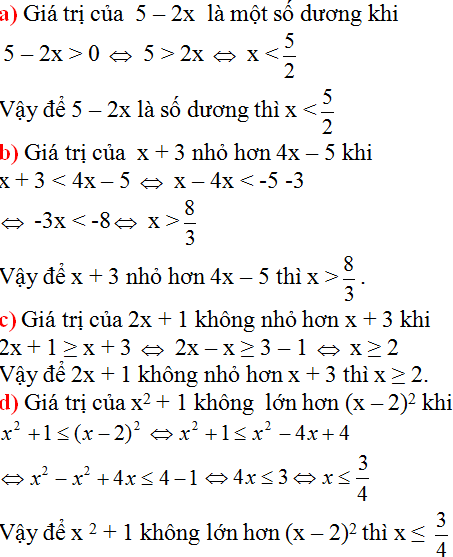Hãy nhập câu hỏi của bạn vào đây, nếu là tài khoản VIP, bạn sẽ được ưu tiên trả lời.

\(A=\dfrac{1}{-x^2+2x-2}\)
A min \(\Leftrightarrow\dfrac{1}{A}\)max
ta có \(\dfrac{1}{A}=-x^2+2x-2=-\left(x^2-2x+2\right)=-\left(x-1\right)^2-1\le-1\)
\(\dfrac{1}{A}\)max= -1 tại x=1
=> A min = -1 tại x=1
\(B=\dfrac{2}{-4x^2+8x-5}\) ( phải là -4x2 nha bn)
B min \(\Leftrightarrow\dfrac{1}{B}\) max
ta có \(\dfrac{1}{B}=\dfrac{-4x^2+8x-5}{2}=\dfrac{-\left(4x^2-8x+5\right)}{2}=\dfrac{-\left(2x-4\right)^2+11}{2}=\dfrac{\left(-2x-4\right)^2}{2}+\dfrac{11}{2}\le\dfrac{11}{2}\)
\(\dfrac{1}{B}\)max=\(\dfrac{11}{2}\) tại x=2
\(\Rightarrow B\) min = \(\dfrac{1}{\dfrac{11}{2}}=\dfrac{2}{11}\) tại x=2
\(A=\dfrac{3}{2x^2+2x+3}=\dfrac{3}{2\left(x^2+2.x.\dfrac{1}{2}+\dfrac{1}{4}\right)+\dfrac{5}{2}}=\dfrac{3}{2\left(x+\dfrac{1}{2}\right)^2+\dfrac{5}{2}}\)
A max \(\Leftrightarrow\dfrac{1}{A}\) min
\(\Leftrightarrow\dfrac{2\left(x+\dfrac{1}{2}\right)^2+\dfrac{5}{2}}{3}=\dfrac{2\left(x+\dfrac{1}{2}\right)^2}{3}+\dfrac{\dfrac{5}{2}}{3}=\dfrac{2\left(x+\dfrac{1}{2}\right)^2}{3}+\dfrac{5}{6}\ge\dfrac{5}{6}\)
\(\dfrac{1}{A}\) min = \(\dfrac{5}{6}\)tại x= \(-\dfrac{1}{2}\)
\(\Rightarrow A\)max = \(\dfrac{6}{5}\) tại x= \(-\dfrac{1}{2}\)
B\(=\dfrac{5}{3x^2+4x+15}=\dfrac{5}{3.\left(x^2+\dfrac{4}{3}x+5\right)}=\dfrac{5}{3\left(x^2+2.x.\dfrac{2}{3}+\dfrac{4}{9}+\dfrac{41}{9}\right)}=\dfrac{5}{3\left(x+\dfrac{2}{3}\right)^2+\dfrac{41}{3}}\)
B max \(\Leftrightarrow\dfrac{1}{B}\) min
\(\Leftrightarrow\dfrac{3\left(x+\dfrac{2}{3}\right)^2+\dfrac{41}{3}}{5}=\dfrac{3\left(x+\dfrac{2}{3}\right)^2}{5}+\dfrac{41}{15}\ge\dfrac{41}{15}\)
\(\dfrac{1}{B}\) min = \(\dfrac{41}{15}\) tại x=\(-\dfrac{2}{3}\)
=> \(B\) max = \(\dfrac{15}{41}\) tại x=\(-\dfrac{2}{3}\)
Đây chỉ là gợi ý !! bn pải tự lí luận nha
tik ![]()

a: \(\dfrac{2x-3}{35}+\dfrac{x\left(x-2\right)}{7}\le\dfrac{x^2}{7}-\dfrac{2x-3}{5}\)
\(\Leftrightarrow2x-3+5x\left(x-2\right)\le5x^2-7\left(2x-3\right)\)
\(\Leftrightarrow2x-3+5x^2-10x< =5x^2-14x+21\)
=>-8x-3<=-14x+21
=>6x<=24
hay x<=4
b: \(\dfrac{6x+1}{18}+\dfrac{x+3}{12}>=\dfrac{5x+3}{6}+\dfrac{12-5x}{9}\)
=>2(6x+1)+3(x+3)>=6(5x+3)+4(12-5x)
=>12x+2+3x+9>=30x+18+48-20x
=>15x+11>=10x+66
=>5x>=55
hay x>=11

a, Ta có : \(A=\frac{1}{x+2}-\frac{2x}{4-x^2}+\frac{3}{x-2}\)
\(=\frac{1}{x+2}-\frac{2x}{\left(2-x\right)\left(x+2\right)}+\frac{3}{x-2}\)
\(=\frac{x-2}{\left(x+2\right)\left(x-2\right)}+\frac{2x}{\left(x-2\right)\left(x+2\right)}+\frac{3\left(x+2\right)}{\left(x-2\right)\left(x+2\right)}\)
\(=\frac{x-2+2x+3x+6}{\left(x-2\right)\left(x+2\right)}=\frac{6x+4}{\left(x-2\right)\left(x+2\right)}\)
Suy ra : \(M=\frac{6x+4}{\left(x-2\right)\left(x+2\right)}.\frac{x+2}{3x+2}\)
\(=\frac{2\left(3x+2\right)\left(x+2\right)}{\left(x-2\right)\left(x+2\right)\left(3x+2\right)}=\frac{2}{x-2}\)

1) a) Đặt biểu thức là A
\(A=2x^2+4y^2-4xy-4x-4y+2017\)
\(A=\left(x-2y\right)^2+x^2-4x-4y+2017\)
\(A=\left(x-2y\right)^2+2\left(x-2y\right)+x^2-6x+2017\)
\(A=\left(x-2y-1\right)^2+\left(x+3\right)^2+2008\)
Vậy: MinA=2008 khi x=-3; y=-2
3) a) \(A=\dfrac{1}{x^2+x+1}\)
\(B=x^2+x+1=\left(x+\dfrac{1}{2}\right)^2+\dfrac{3}{4}\)
\(\Rightarrow B\ge\dfrac{3}{4}\Rightarrow A\ge\dfrac{4}{3}\)
Vậy MinA là \(\dfrac{4}{3}\) khi x=-0,5

a) \(\dfrac{5-2x}{6}>\dfrac{5x-2}{3}\\ < =>\dfrac{5-2x}{6}>\dfrac{10x-4}{6}\\ < =>5-2x>10x-4\\ < =>-2x-10x>-4-5\\ < =>-12x>-9\\ =>x< \dfrac{-9}{-12}\\ < =>x< \dfrac{3}{4}\)
Vậy: Tập nghiệm của bất phương trình là S= \(\left\{x|x< \dfrac{3}{4}\right\}\)
b) \(\dfrac{1,5-x}{5}< \dfrac{4x+5}{2}\\ < =>\dfrac{3-2x}{10}< \dfrac{20x+25}{10}\\ < =>3-2x< 20x+25\\ < =>-2x-20x< 25-3\\ < =>-22x< 22\\ =>x>\dfrac{22}{-22}\\ < =>x>-1\)
Vậy: tập nghiệm của bất phương trình là S= \(\left\{x|x>-1\right\}\)

\(1,a,A=x^2-6x+25\)
\(=x^2-2.x.3+9-9+25\)
\(=\left(x-3\right)^2+16\)
Ta có :
\(\left(x-3\right)^2\ge0\)Với mọi x
\(\Rightarrow\left(x-3\right)^2+16\ge16\)
Hay \(A\ge16\)
\(\Rightarrow A_{min}=16\)
\(\Leftrightarrow x=3\)

\(A=2x^2-7x+5=2\left(x^2-\dfrac{7}{2}x\right)+5=2\left(x^2-2.x.\dfrac{7}{4}+\dfrac{49}{16}\right)-\dfrac{9}{8}\\ =2\left(x-\dfrac{7}{4}\right)^2-\dfrac{9}{8}\ge-\dfrac{9}{8}\)
\(B=x^2-5x=x^2-2.x.\dfrac{5}{2}+\dfrac{25}{4}-\dfrac{25}{4}=\left(x-\dfrac{5}{2}\right)^2-\dfrac{25}{4}\ge\dfrac{-25}{4}\)

a) Ta có: \(2x^2+2x+3=\left(\sqrt{2}x\right)^2+2.\sqrt{2}x.\frac{1}{\sqrt{2}}+\frac{1}{2}+\frac{5}{2}\)
\(=\left(\sqrt{2}x+\frac{1}{\sqrt{2}}\right)^2+\frac{5}{2}\ge\frac{5}{2}\)
\(\Rightarrow S\le\frac{3}{\frac{5}{2}}=\frac{6}{5}\)
Vậy \(S_{max}=\frac{6}{5}\Leftrightarrow\sqrt{2}x+\frac{1}{\sqrt{2}}=0\Leftrightarrow x=-\frac{1}{2}\)
b) Ta có: \(3x^2+4x+15=\left(\sqrt{3}x\right)^2+2.\sqrt{3}x.\frac{2}{\sqrt{3}}+\frac{4}{3}+\frac{41}{3}\)
\(=\left(\sqrt{3}x+\frac{2}{\sqrt{3}}\right)^2+\frac{41}{3}\ge\frac{41}{3}\)
\(\Rightarrow T\le\frac{5}{\frac{41}{3}}=\frac{15}{41}\)
Vậy \(T_{max}=\frac{15}{41}\Leftrightarrow\sqrt{3}x+\frac{2}{\sqrt{3}}=0\Leftrightarrow x=\frac{-2}{3}\)
c) Ta có: \(-x^2+2x-2=-\left(x^2-2x+1\right)-1\)
\(=-\left(x-1\right)^2-1\le-1\)
\(\Rightarrow V\ge\frac{1}{-1}=-1\)
Vậy \(V_{min}=-1\Leftrightarrow x-1=0\Leftrightarrow x=1\)
d) Ta có: \(-4x^2+8x-5=-\left(4x^2-8x+5\right)\)
\(=-\left(4x^2-8x+4\right)-1\)
\(=-\left(2x-2\right)^2-1\le-1\)
\(\Rightarrow X\ge\frac{2}{-1}=-2\)
Vậy \(X_{min}=-2\Leftrightarrow2x-2=0\Leftrightarrow x=1\)


\(P=AB=\dfrac{x}{x-5}\cdot\left(x-5\right)\left(x+3\right)=x\left(x+3\right)=x^2+3x\\ P=x^2+2\cdot\dfrac{3}{2}x+\dfrac{9}{4}-\dfrac{9}{4}=\left(x+\dfrac{3}{2}\right)^2-\dfrac{9}{4}\ge-\dfrac{9}{4}\\ P_{min}=-\dfrac{9}{4}\Leftrightarrow x=-\dfrac{3}{2}\)